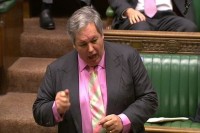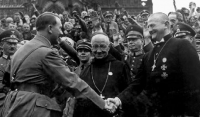The Dys-established Church
 Ponder with me for a moment the hypocrisy of the scene. In the House of Commons stands a man, Tony Baldry by name, who has the formal title of “Second Church Estates Commissionerâ€. He stands in his role as representing the Church of England in Parliament and takes that opportunity to attack it. What is his criticism? The Church of England is sexist and is completely out of touch with the wider society. How dare they not approve the measure to allow women to be Bishops. How dare they behave in such a bigoted way.
Ponder with me for a moment the hypocrisy of the scene. In the House of Commons stands a man, Tony Baldry by name, who has the formal title of “Second Church Estates Commissionerâ€. He stands in his role as representing the Church of England in Parliament and takes that opportunity to attack it. What is his criticism? The Church of England is sexist and is completely out of touch with the wider society. How dare they not approve the measure to allow women to be Bishops. How dare they behave in such a bigoted way.
Which is priceless coming from a man wearing a Garrick Club tie, one of the last London Clubs not to admit women as members.
Over the past few days we have seen all kinds of nonsense in the media about the vote in Synod itself but also how Parliament should respond. We have been told that the House of Laity is undemocratic and unrepresentative. However, the fact that these criticisms only emerged after the vote betrays the simply truth that they are not arguments of conscience but rather of convenience. We have heard angry denouncements of the two-thirds majority vote required to pass legislation, but such vitriol neglects the fact that that high bar exists in order to provide consensus – it is the epitome of the “broad churchâ€.
But the most nonsensical suggestion we have had so far is that Parliament should intervene and tell the Church what to do. This thought, above all others, fills me with dread and I wonder whether the proponents of such a move within the CofE really understand what they are asking for. The fact that we are a State Church does not mean that we are the State’s Church. What I mean by this is that we are not owned by the State and we are not at its uncritical beck and call. We have no statutory obligation to reflect its character and indeed, we have been at our best when we have deliberately opposed the State’s character (“Faith in the City†anybody)?
Since the 1920s and the aftermath of the debacle that was the 1928 Prayer Book, Parliament has kept well and truly distant from the law making in the Church. First we had the Church Assembly and now it’s successor the General Synod continues to shape and pass legislation affecting its own jurisdiction. These two devolved Parliaments have governed the Church for decades and no-one has batted an eyelid. But now, the moment we do something the liberal intelligentsia doesn’t like (fail to pass a motion because we are unsatisfied with the provisions within it), all of that is up for grabs and we can tear up the past century of legislative understanding.
 Liberals should not think that allowing Parliament to over-ride Synod will be a one-off affair. Once Parliament has established the precedent that it can tell the State Church exactly what it should or should not do, do not expect it to then not bother again in the future. Every single churchman who looks to Parliament (and not ourselves) to sort out this mess is offering to sell their doctrinal and ethical birthright for a bowl of collaborationist pottage.
Liberals should not think that allowing Parliament to over-ride Synod will be a one-off affair. Once Parliament has established the precedent that it can tell the State Church exactly what it should or should not do, do not expect it to then not bother again in the future. Every single churchman who looks to Parliament (and not ourselves) to sort out this mess is offering to sell their doctrinal and ethical birthright for a bowl of collaborationist pottage.
One snowy Austrian night in the winter of 1941, my Grandfather’s house was raided by the police looking for any evidence linking him to elements within the Confessing Church in Nazi Germany that sought to bring down that government. Seventy years later, and in the aftermath of a disappointing vote that didn’t go their way, liberals in the Church of England are now suggesting (though they don’t realise it) that a Church of England that will not automatically acquiesce to the current tide of social opinion should be made to conform and submit to the will of the sphere of Government. I don’t think the advocates of such a move really understand what they are actually proposing, nor what the future of such an Englisch Church would actually be.
Leave a Reply